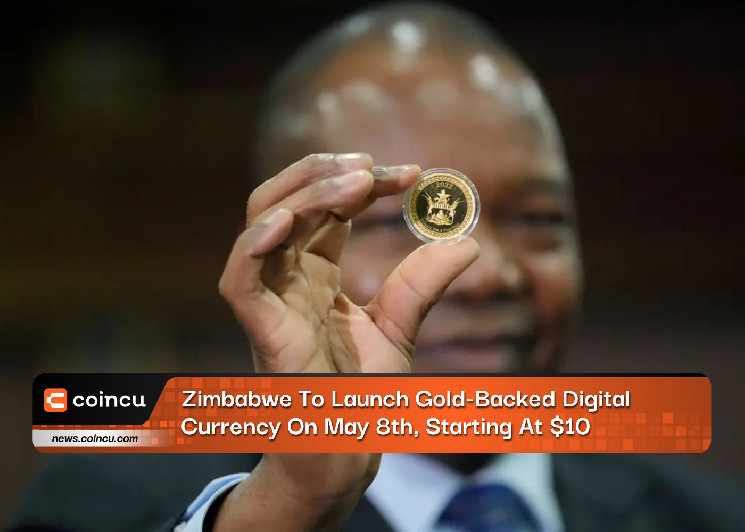Zimbabwe’s central bank is preparing to launch a gold-backed digital currency on May 8th, in a possible attempt to stabilize the country’s unstable currency and attract foreign investment. The digital tokens will be available for purchase by individuals and corporations, with prices starting at $10 for retail investors and $5,000 for larger entities. Transactions will be possible in both U.S. dollars and Zimbabwean dollars, with the local currency version being sold at a 20% margin above the interbank mid-rate.
This move can be seen as the African nation’s latest effort to revive its struggling economy by leveraging digital technology. Zimbabwe’s local currency has weakened by 37% against the USD on the official market this year, forcing the government to explore innovative solutions. This is not the first time Zimbabwe has attempted to support its currency using gold; in 2021, the nation introduced gold coins as a store of value to help stabilize the Zimbabwean dollar.
Zimbabwe now joins Nigeria as the second African country to introduce a digital currency; Nigeria launched its own digital currency, the eNaira, in 2021. Adopting digital currencies presents numerous potential benefits, such as streamlining financial transactions, reducing costs, and improving financial inclusion for all citizens.
Although Zimbabwe’s gold-backed digital currency may not immediately resolve the economic challenges faced by the nation, it is an ambitious step toward embracing digital technology to spur economic growth. This move also reflects the country’s willingness to adapt and innovate in an ever-evolving global financial landscape.
As we have seen in recent years, digital currencies are gaining popularity all over the world, with many countries considering launching their own digital currencies in the near future. The interest in digital currencies can be attributed to their potential to boost security, transparency, and accessibility in financial transactions.
In the case of Zimbabwe, the introduction of a gold-backed digital currency could potentially offer a viable solution to their ongoing currency crisis. By linking the digital currency to a physical asset, the nation hopes to ensure stability and encourage international investors to engage with Zimbabwe’s economy. Furthermore, by adopting a digital currency, Zimbabwe will be able to benefit from the cost reductions associated with digital transactions and the increased efficiency of financial processes.
It is important to note that this gold-backed digital currency launch is not without risks or challenges. For instance, the country may face difficulties in attracting investment due to ongoing concerns regarding Zimbabwe’s overall economic stability, as well as potential skepticism from investors who may be uncertain about the viability of gold-backed digital currencies.
Nevertheless, the launch of this digital currency on May 8th presents a significant opportunity for Zimbabwe to test the waters, as well as gather data and insights that may inform future financial policies and strategies. As the world continues to move towards a more digitized financial landscape, Zimbabwe’s digital currency experiment serves as an interesting case study for other countries looking to explore the potential advantages of digital currencies.
In conclusion, Zimbabwe’s planned launch of a gold-backed digital currency represents a bold and innovative attempt to address and ultimately alleviate the nation’s economic challenges. Whether or not this initiative successfully stabilizes the country’s currency and attracts much-needed overseas investment remains to be seen, but it is a testament to the increasing global interest in digital currencies and their potential applications.
DISCLAIMER: The Information on this website is provided as general market commentary and does not constitute investment advice. We encourage you to do your own research before investing.


